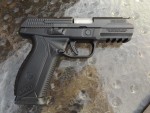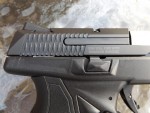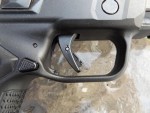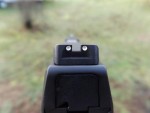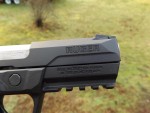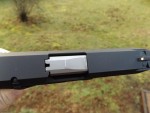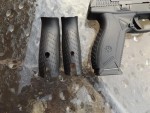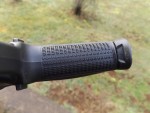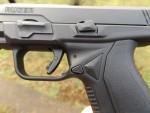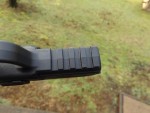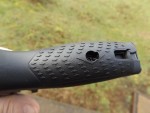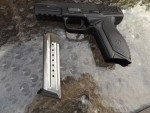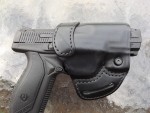I’ve been a huge fan of Ruger firearms since 1979, when I bought my first Ruger centerfire rifle in .300 Winchester Mag. Everyone anticipated the first cernterfire semiauto pistol from Ruger in 1985, when it was first announced. Alas, there were problems, and the Ruger P85 didn’t actually come out until 1987. I lived in Colorado Springs, CO at the time and operated a small gun business with a friend out of his gas station as well as gun shows, but we couldn’t get our hands on a P85. One gun shop in the entire city had received one sample, and it wasn’t for sale, but there was literally a line of guys waiting to handle it and place their order for one. The P85 was ugly as sin; it was big and bulky, too. I loved it!
I didn’t get my own P85 until we had moved back to Oregon in 1988, and in one week I actually received two P85s. I was in heaven. However, one of the guns had a problem I couldn’t figure out. The slide would lock halfway open during firing and I had to remove the magazine and pound the slide closed. For the life of me, I couldn’t see what the problem was. The gun was sent to Ruger and repaired, without an explanation, and returned to me. Since this time, I’ve owned every P-series pistol that Ruger has made over the years. Several years ago, Ruger came out with a completely different pistol in their SR-series– striker fired, and once again I owned all the different models.
The P-85 developed a problem with the firing pin breaking, and it could have potentially fired when you decocked the gun. In short order, to Ruger’s credit, they recalled those guns, corrected the problem, and stamped MKII on the slides, so you knew the problem was taken care of. I applaud Ruger for this. They are fast to jump on a problem and take care of it, unlike some other gun makers who want to hide the problem, hoping it will go away. Ruger came out with the P-89 in 1989, basically the P-85 without any problems. Since then, Ruger has had a whole host of centerfire pistols over the years, and every last one was a winner in my book.
A few days before New Years Day, 2015, I received a press release from Ruger, introducing their brand-new, striker-fired “American” semiauto pistol. I loved what I saw and read. The gun is very sleek, very up-to-date, and modern looking. I hate boring our readers with all the specs on guns, so go to the Ruger website, where they will give you all that information.
The new American from Ruger is only being produced in 9mm and .45ACP, with no plans on coming out with one in .40S&W anytime soon. The .40 S&W is falling out of favor these days, especially with law enforcement. They are going back to the 9mm in droves. With new developments in JHP 9mm ammunition these days, the 9mm is supposedly right up there in stopping power with the .40 S&W, and it is easier to shoot. There is a lot less recoil, and police qualifying scores are going up since they switched back to the 9mm; hits and hits only are what count. So, we may not see a Ruger American in .40 S&W.
I didn’t receive my Ruger American Pro 9mm sample until more than two weeks after I ordered it. Ruger is slammed with orders. Demand is outstripping production right now. That’s how popular the American is, right out of the gate. Of course, my local gun shop got in their order for the American a day before I got my sample, and needless to say they really rubbed it in that they, once again, got a new gun before I did. It doesn’t happen often, but when it does, they really get on my case about it.
Over the course of three days I put more than 500-rds though my Ruger sample. Unlike most blogs out there, SurvivalBlog.com will never report on a new product based solely on a press release. Yeah, a lot of gun and survival blogs were 2½ weeks ahead of us reporting on a gun they didn’t have. They simply wrote on their blogs what was on the Ruger press release. That’s not fair to their readers, and we won’t do that, EVER!
The new Ruger American Pro 9 is a striker-fired handgun, which is the trend these days. It has a black polymer frame, and the slide is blackened stainless steel. The frame has several Picatinny rails for mounting lights and/or lasers; previous Ruger’s didn’t have but one rail mounting point. The slide is very sleek looking, and it has cocking serrations on the rear of the slide. There is also a massive external extractor right in front on the right side of the gun. Funny thing is, there is nothing on my sample with the “American” moniker on it. On the front of the slide on either side, it simply has “Ruger” on it. We also have a genuine Novake rear sight on the slide, which is nice, real nice. Two white dots on the rear sight, and one white dot on the front sight make it very fast and easy to pick-up. There is a lot of light between the front and rear sight on either side of the front sight, which makes it great for combat work but not for precise target shooting . Then again, this isn’t a target gun; keep that in mind!
Gone is the big “flag” that Ruger was putting on their SR series, alerting you that there was a round in the chamber. No one liked it. Instead, we have a cut in the rear of the barrel’s chamber, where you can see if there is a round in there. It seems like everyone is going to this sort of thing, and many states require it, if you want to sell a handgun in their state. Moving down to the frame, there is no manual safety, instead it has the little lever in the front of the trigger. That is popular; the gun can’t fire if you don’t have pressure on the trigger, pushing the lever backwards. There is also several internal, passive safeties that won’t allow the gun to fire if dropped. There is a full-time ambi slide release, and on the left side is the take down lever. Remove the magazine, lock the slide open, and rotate the lever down, and then carefully, while holding the slide, release it and the slide comes off, and you can then remove the recoil spring and barrel. It’s just that simple and fast.
Moving down on the frame, we have a full-time magazine release, one triangular button on either side of the frame, right behind the trigger guard. And, as already mentioned, the frame has Picatinny rails for mounting lights and/or lasers. The front strap of the frame has several different diamond patterns on it, for a sure grip; I love it. The back strap has diamond patterns on it, but they’re different. (See the pics.) Now, here is where things get interesting. The back strap is removable/replaceable. My sample came with the medium-sized back strap; however, included in the nice black polymer case the American came in is two more back straps– one smaller/thinner and one bigger front to back and thicker. A Torx head tool is included for changing out the back straps. I tried all three, and settled on the medium-sized one that was on the gun. However, quite honestly, I could live with any of the three back straps. They all felt good to my hands. We also have a lanyard attachment on the rear of the butt of the gun. This is obviously geared toward law enforcement. A lot of cops in foreign countries have their guns attached to a lanyard so it can’t be taken from them.
The trigger guard is not quite square-ish but is very nicely done with none of those silly serrations or checkering on the front that used to be in favor, for those who placed the trigger finger of their off-hand on the front of the trigger guard. Plus, the trigger guard is large enough for a gloved hand, which is another nice touch. We also want to mention the extended “beaver tail” on the frame. On some guns, especially a GLOCK, if you are wearing heavy gloves in the winter and your have a high hold on the gun with your gun hand, the slide can and does get caught on the gloves, producing a malfunction. On the Ruger American, the beaver tail is placed perfectly, still giving you a high hand hold on the gun, but the slide won’t catch your thick-gloved hand. A lot of thought went into the feature.
The American comes with two nickel/Teflon coated 17-rd magazines, and needless to say you won’t see any on the market for a while. You’ll have to purchase them directly from Ruger for the time being. I placed an order for another mag at www.shopruger.com. Mags are in short supply right now. The magazines have viewing holes, starting at hole #4 and ending with hole #17, so you have a good idea of how many rounds are left in your mag. The mags were easy to load, until I got to the 16th and 17th rounds; they were a bugger to stuff into the mags. Then again, many handgun mags are hard to fully load. What I do is load my mags to full-capacity and let them sit for a couple weeks. After that, those last few rounds are easy to insert. So then you have a fully loaded magazine, not a problem!
The American has been tested for sustained +P fire, and I have no doubts the gun will hold up to all the +P ammo you want to shoot through it, if you can afford the price tag for +P ammo. To be sure, no gun makers recommend that you run +P+ ammo through their guns; some of this ammo is really hot-loaded to “proof” loading pressures, so be advised.
BTW, Ruger advertises the trigger return as crisp, with a short take-up. The take-up before firing is short, and the trigger reset is very positive. The trigger pull on my sample broke at 5.5-lbs, but it didn’t feel that heavy in the least. The trigger is actually more of a two-stage one with some take-up and then you feel some resistance before the gun fires. This is much better than many other striker-fired handguns I’ve used over the years. I like it.
The Ruger American weighs in at 30-oz for the 9mm version and only an ounce more for the .45ACP version, which is a little bit heavier than some other polymer framed handguns, but this is a full-sized, duty gun. My crystal ball is working and I predict we will start seeing these guns in duty holsters at various law enforcement agencies and without a doubt, in military holsters all over the world. Ruger is going to put a serious dent in GLOCK and S&W M&P sales. Full retain is $589, but once supply catches up with demand you’ll see the Ruger American selling for under $500; that’s a lot less than a GLOCK and about the same as a S&W M&P. Based on my testing, I’d pick the American over the GLOCK or M&P for a duty gun, if I were a cop again!
If you check out Ruger’s website, you will find that they already have a list of holster makers who have holsters in-stock and ready to ship that will fit the American. I have more holsters than I care to admit, so I started experimenting with them and the American. I found that the Blackhawk Products leather Askins holster, for concealed carry, fit my American sample perfectly. Also, I have some old Uncle Mike’s duty and concealed holsters that also fit the American. So, unlike many new handguns that come on the market with no one making holsters for them, Ruger saw to it that you won’t have a problem finding a holster to fit their new handguns.
As soon as I received my Ruger American Pro 9mm sample, I ran out to my usual shooting spot to run some ammo through the sample. I had an outstanding supply of 9mm from Black Hills Ammunition and Buffalo Bore Ammunition for my testing. Of course, it had to be pouring down rain, but rain doesn’t stop my shooting; extreme summer heat does though.
From Black Hills, I had their 100-gr Frangible load– factor seconds. This load isn’t sold to the public. I had forgotten I had some left from a few years ago and only had a couple boxes. This ammo breaks apart when it hits something solid, like a steel backstop at a firing range. I also had their 115-gr JHP +P, 124-gr JHP +P, 115-gr FMJ, 124-gr JHP, 115-gr Barnes TAC –XP +P loads – a great assortment. From Buffalo Bore, I had their 147-gr Hard Cast FN +P load, 147-gr JHP sub sonic JHP load, 147-gr FMJ sub sonic, 115-gr Barnes TAC XP +P+, and the Barnes loads from Black Hills and Buffalo Bore are an all-copper hollow point load. I had the 124-gr FMJ FN +P+ Penetrator round and their 115-gr JHP +P+ load. It was quite an assortment of different loads and different bullet weights to test in the American.
I had a strange thing happen during the first three 17-rd mags I fired, and that was that the empty brass was being flung in all directions. After those first three mags, the empties were all going in a nice little pile to the right of the gun. I guess things needed to settle down in the new gun. I’ve had this same thing happen with some other brand-new guns; the brass would go every place to start with. Then the gun would settle down. Eventually, the brass was going where it needed to go, so don’t think this is a “problem” with any new gun. I just wanted to mention it.
My second day of shooting was fairly nice weather with no rain. My beautiful wife helped me with the shooting but not loading magazines. She always leaves that job to me for some reason. Throughout my testing those last two rounds, in both magazines, were a real bugger to get loaded, but as I said before load-up those mags and let ‘em sit for two weeks. Then, the last two rounds will slide right in there. I’ve been there and done that with many brand-new magazines. Again, it’s not a “problem” to the Ruger magazines, not in the least. On my third day of testing, we had clouds and it was chilly. I was out shooting alone. The thumb on my right hand was taking a beating from loading those magazines, and it was bruised and sore, real sore. I wanted to get all my shooting in as soon as I could, so I could give our readers a real report on the new Ruger, not just copying from the press release, like so many other blogs have done.
There was not a single malfunction in all my testing, not even a hint of a problem, other than those first three magazines I fired, with the empty brass being flung all over the place. The American chugged along without any problems. Then, it dawned on me that I never lubed the gun. It was pretty dry with just some packing oils on it. I broke the gun down, before I fired it the first time, to check things out but didn’t lube the gun in all my shooting and there were no problems. Yes!!
At 25-yards, I could keep my groups around 3-inches or less, if I did my part, and when I was getting tired, the groups opened-up to 4-inches. My accuracy testing was done over a rolled up sleeping bag, over the hood of my pickup truck. Honestly, I didn’t test all the various ammo during my testing for accuracy. There was just too big of a selection to pick from, and I wanted to get this article out to our readers. If I was on my game and fresh, the Black Hills 124-gr JHP load was the winner with groups slightly under 3-inches, but I think the Ruger can do better. Right on the heels of that load was the Bufflo Bore 147-gr FMJ sub sonic load. Tied for third place was the Black Hills 115-gr JHP +P and the Buffalo Bore 147-gr Hard Cast FN +P load. There were no losers in the accuracy department, and as mentioned, I think the Ruger can go even better, when I take some time to really wring it out for accuracy. Still, three inch groups for a “duty” handgun, that’s more than acceptable, much more than acceptable!
Without a doubt, the Ruger designers took some serious time to design this gun, and they listened to shooters, too. It has all the features you need and nothing you don’t. Night sights would be nice, and I’m sure the after-market folks will come out with some, if Ruger doesn’t.
We’ve come a long, long way since the Ruger P-85 came out in 1987, and along the way I’ve seen each new model that Ruger came out with get better and better. I don’t know how Ruger is going to top themselves with their next centerfire semiauto pistol. They are going to have to work extra hard at it. The new Ruger American is a total winner in my book. Now the only problem I have is trying to talk myself out of not getting one in 9mm. No sooner do I get close to getting Ruger paid-off on gun samples I kept, then they go and do this to me. Here’s another new gun that I’m going to keep and pay for, but now I want one in .45ACP, too. Ruger, you did it up right this time, 110% right. We all appreciate it!
– Senior Product Review Editor, Pat Cascio










